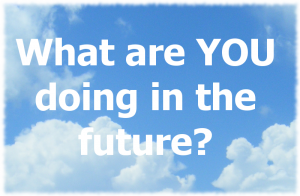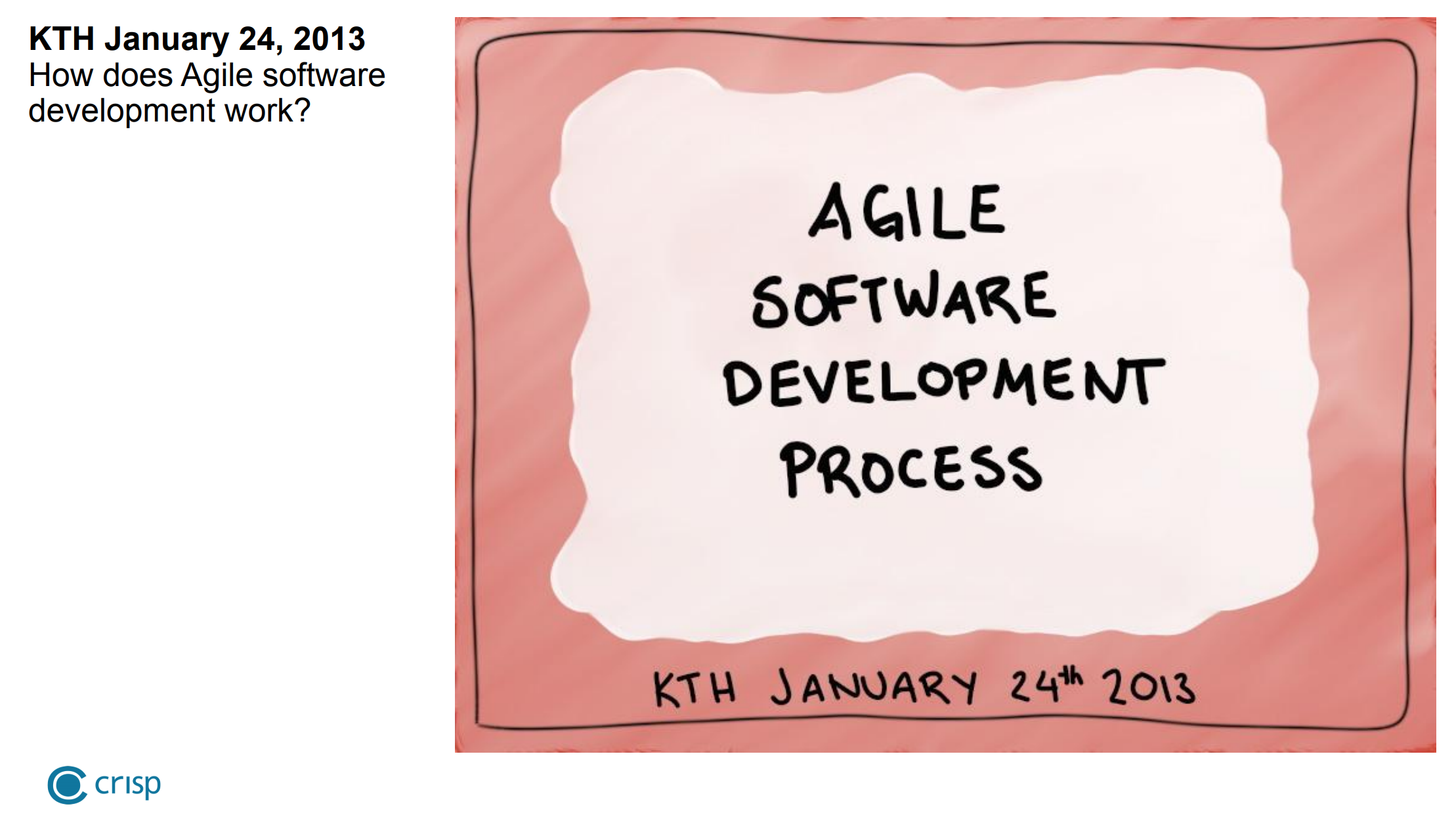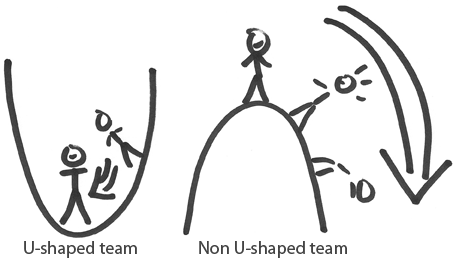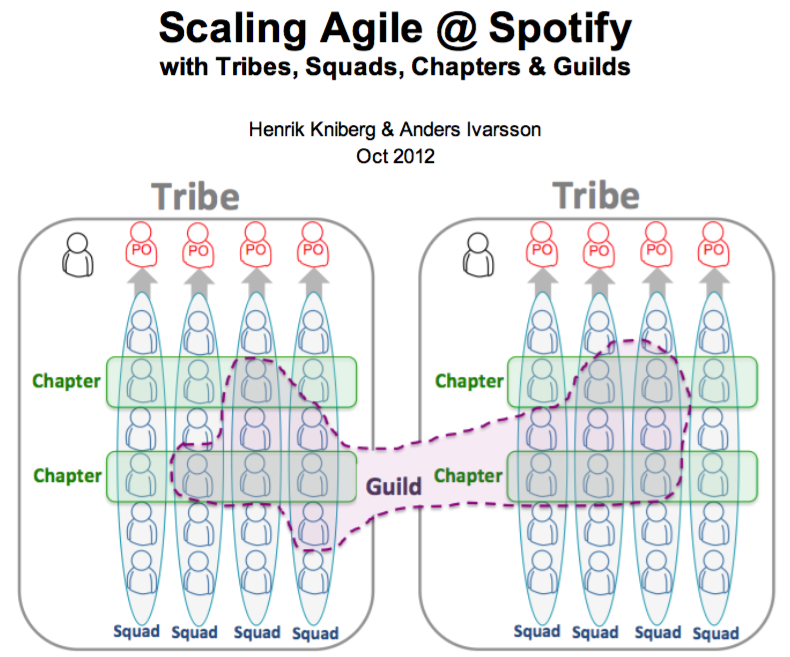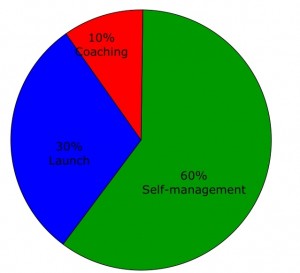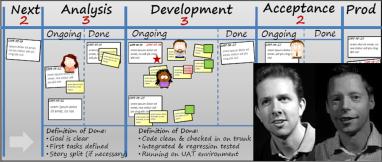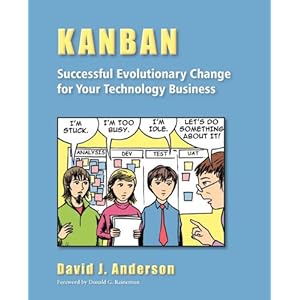Agile India 2013 in Bangalore. Wow, what an awesome conference! I was amazed by the energy level of the participants, spent hours talking to people about all kinds of really interesting challenges. Based on the fully packed rooms and incredible feedback, it seems like my talks were exactly the kind of information people were looking
Continue readingThe Future of Software Development
What will software development be like in the future? “Agile” as we know it, will not be around, nor will test-driven development, continuous delivery, or BDD-like methodologies. I’ve been pondering this for a while, and based on some observations and a dose of wishful thinking, I’ve arrived at the conclusion above. Do you agree?
Agile Software Development Slides
I gave a talk to a group of mechatronics students at KTH (Royal Institute of Technology) today. The topic was agile software development with an emphasis on Scrum, and some information about Kanban and Lean Startup. Here are the slides: KTH-2013 Get in touch via my homepage if you have questions or comments!
Continue readingT-shaped people and U-shaped teams
I guess you have heard about T-shaped people, that is, people with deep skills within one or a few areas combined with some knowledge in many areas.
Now it’s time to introduce U-shaped teams. That is, teams that are balanced and where teammates are helping each other. It’s a team where you might have a bad day and are allowed to fail without causing consequences. It’s where the teammates help you get back to normal and what’s more make you feel comfortably included in the team. Your team becomes your safety net and it’s the place where you can dare to be vulnerable. U-shaped teams are also good for productivity since safety means productivity. *
Scaling Agile @ Spotify with Tribes, Squads, Chapters & Guilds
(UPDATE: see Spotify Engineering Culture, two short animated videos showing how we work)
Dealing with multiple teams in a product development organization is always a challenge!
One of the most impressive examples I’ve seen so far is Spotify. I’ve had the pleasure of working with Spotify on and off ever since the company was founded, and it’s one of the few companies I’ve seen with a truly agile culture. Spotify has grown a lot lately and now has hundreds of developers divided into 30 agile teams spread over 4 cities in 3 timezones. So how is this managed?
Check out the article: Scaling Agile @ Spotify with Tribes, Squads, Chapters and Guilds. I wrote it together with Anders Ivarsson, one of the agile coaches that I’m working with (Spotify has a truly awesome group of coaches!).
Lean from the Trenches @ Øredev
Here are the slides for my talk “Lean from the Trenches” at Øredev, Malmö. And here is the book/ebook, in case you want more details. There may also be some copies left at the conference bookstore. Thanks for attending!
Continue readingTeam LiftOff with Market of Skills and Competence Matrix
Introduction
I got into agile development during the late 90s when I read Kent Beck’s book about extreme programming (XP). It was mostly the technical aspects of XP that attracted me; I liked test driven development and continuous integration and I understood the benefit of continuously reviewing the code by doing pair programming. It took some time for me to turn my attention to what I mainly focus on today, and what I see is a cornerstone of agile, teamwork. Product development is in most cases a complex endeavor where you need a high level of collaboration and teamwork to reach required outcome. To succeed you have to make sure the participants build on each others strength and knowledge, and where they see differences as something valuable and important. But it is not certain that all working groups ends up as a true team. As a team coach you need to pay attention to building the team at the beginning. This post will describe a few tools that I have used in order to form teams.
Agile Product Ownership in a nutshell
This is basically a 1 day product ownership course compressed into a 15 minute animated presentation.
Over a million views! Some call it “The best 15 minutes on the Internet” 🙂
There’s obviously more to product ownership than this, so see this is a high level summary.
- Here’s the complete drawing (.png format)
- Here’s a downloadable version of the video, in case you don’t want to stream (.mov format, 90 Mb)
Special thanks to Alistair Cockburn, Tom & Mary Poppendieck, Jeff Patton, Ron Jeffries, Jeff Sutherland, and Michael Dubakov for providing many of the models, metaphors, and ideas that I use in this presentation.
Translations: (see also the translation guide by Cédric Chevalerias)
- Chinese – simplified (subtitles)
- Chinese – traditional (subtitles)
- French(subtitles)
- French (voice)
- German (subtitles)
- German(voice)
- Italian (voice)
- Japanese (subtitles)
- Polish (voice)
- Portuguese – Portugal (voice)
- Portuguese – Brazil (voice)
- Russian (voice)
- Spanish (subtitles)
Below is a full transcript in english. But I recommend watching the video instead of reading the transcript. The video is 100% visual, the transcript is 0% visual…
From Jira to Trello
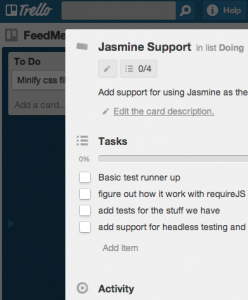 For the past couple of years I’ve had to work with Jira. Really, it’s mostly been dreading working with Jira. At both projects I’ve had Greenhopper available, and that hasn’t really made things better. My frustrations have had to do with the complexity of setting up the right fields, to creating a new sprint to creating a new project, down to mundane things like problems with ranking. I don’t particularly enjoy spending hours just tidying up my data. I want to quickly organize so I have time to actually work. I also want to easily see how much work we’ve done, and how much we have to do. Cards and a physical board are great for this, but I end up with stacks of cards everywhere, and after several sprints I don’t know what to do with them anymore. Enter Trello!Continue reading
For the past couple of years I’ve had to work with Jira. Really, it’s mostly been dreading working with Jira. At both projects I’ve had Greenhopper available, and that hasn’t really made things better. My frustrations have had to do with the complexity of setting up the right fields, to creating a new sprint to creating a new project, down to mundane things like problems with ranking. I don’t particularly enjoy spending hours just tidying up my data. I want to quickly organize so I have time to actually work. I also want to easily see how much work we’ve done, and how much we have to do. Cards and a physical board are great for this, but I end up with stacks of cards everywhere, and after several sprints I don’t know what to do with them anymore. Enter Trello!Continue reading
Programmerarna visar vägen
Lite i skymundan pågår något av en revolution inifrån i IT-branschen, och då särskilt i företag med många programmerare. På gräsrotskonferenser, i nätfora och i management-litteratur äger vår tids kanske mest avancerade och levande diskussion om hur man bäst organiserar arbete rum. Om det skriver jag i en längre essä om hur programmerarna visar vägen
Continue readingLean from the Trenches keynote @ AgileEE, Kiev
Here are the slides for my keynote “Lean from the Trenches” at Agile Eastern Europe, Kiev. And here is the book/ebook, in case you want more details. Thanks for attending!
Continue readingEverybody wants Change – but nobody likes to Be Changed
Here are the slides from my Ale2012 keynote: Everybody wants Change – but nobody likes to Be Changed.
Thanks for coming!
Lean from the Trenches @ Agile2012, Dallas
Here are the slides for my talk “Lean from the Trenches” at Agile2012. And here is the book/ebook, in case you want more details (unfortunately sold out in the conference bookstore). Thanks for attending!
Continue readingR3 – den agila formeln
För ett halvt decennium sedan när jag skulle börja som utvecklingschef på Polopoly kände jag att jag behövde ett verktyg som hjälpte mig att sammanfatta andemeningen och de praktiska konsekvenserna av Agile, Scrum, XP och Lean. Var och en av dessa innehåller en rad – i viss mån överlappande – begrep, som är tydliga och om man kan dem inte så svåra att förklara – om man har många timmar på sig. Men hur minns man hela denna komplexa väv? Hur kan man uttrycka den enkelt, snabbt och koncist?
Case Study of Mobile Team at Projectplace

I am currently working as a Scrum Master for multiple teams at Projectplace in Stockholm, Sweden. One of those teams is the Mobile Team. They are developing Action Boards for both iOS (iPad) and Android platforms. These Action Boards are also available in the Customer Preview of the Projectplace web service. Both Web Team and Mobile Team share the same API’s. The iPad app is planned to be released in 2-3 Sprints from now.
This case study can be written from many perspectives, but in this article I am going to focus on how we are working with the challenges of having a distributed Scrum team.
Great Retrospectives
Great retrospectives are amazing, they have a way of really getting a team to work together and to energize them ahead of a new challenge. But even a great retrospective becomes boring and routine after a while. Luckily, there are a lot of us at Crisp working with different teams, so we got together this evening for a peer to peer exchange about retrospectives. We each got to pitch retrospective exercises and games that we’d like to try, or that we wanted to share. We ended up discussing and trying out 9 of them. Here’s a summary in case you’d like to try some of them out at your next retrospective!
Improving the Daily Scrum
Doing the same thing every day for a long time can get boring. You might even forget why you started doing it in the first place; you just keep doing the same thing, and don’t reflect on what you are getting out of it. The scrum meeting at my current client had gotten into this rut, it had devolved into a status meeting. The participants routinely answered the three questions; what I did yesterday, what I’m going to do today and what impediments I have, but they didn’t really tell each other much about what they had actually done, or what they were planning to do today. They almost never reported any impediments either.
This team has been using Scrum for almost two years. It is a very well working team from a technical perspective; they produced an even amount of user stories each sprint with a high lev el of quality. But they had lost the energy in the scrum implementation. They felt that they could do more; that they could perform even better if they just could just somehow improve their scrum implementation.
el of quality. But they had lost the energy in the scrum implementation. They felt that they could do more; that they could perform even better if they just could just somehow improve their scrum implementation.
We started working on the daily scrum meeting. Our goal was to use the meeting to give the team a good start to the day with energy and desire to start working on the tasks discussed during the meeting. In order to do this we made a few changes, both large and small in how we perform the meeting.
- The structure of the scrum board
- The process of how we perform the scrum meeting
- The location of the scrum board and the meeting
- The metric that we uses to monitor how we are improving the meeting
Tokyo Scrum Gathering keynote: Everybody wants Change, but nobody likes to Be Changed
Here are the slides for my Tokyo Scrum Gathering keynote “Everybody wants Change, but nobody likes to be changed“. Thanks for attending! Sample slides:
Continue readingProperties of a good daily stand-up
I had a conversation with some of my colleagues about what makes a good daily stand-up, here are some properties: Time-boxed (15 minutes) Everyone is engaged Synchronization is taking place Attention to problems People ask for help The conversation is about stuff that matters to most people, individual issues are postponed Anyone can lead the
Continue readingThe Product Owner team
In my opinion, the Product Owner (PO) role is the most demanding one in Scrum, since the PO needs to have so many talents and you rarely find all of them in one single person, so in my current team we formed a PO team instead.
Continue readingAgile Israel slides
Here are the slides from my two presentations at Agile Israel 2011. Thanks for attending! Keynote: Scrum and XP – beyond the trenches The Essence of Agile
Continue readingUpcoming Kanban & Lean & Agile events
Here are some fun workshops that I will be co-teaching during the next few months. Join us! For more info see www.crisp.se. Kanban Applied co-teaching with Mattias Skarin, March 22-23. Mattias is a colleague & lean/agile coach, he co-authored my book "Kanban and Scrum, making the most of both". (details & registration here) Certified ScrumMaster
Continue readingScrum and XP – Beyond the trenches
Here are the slides from my presentation "Scrum and XP – Beyond the trenches" at JFokus. Thanks for coming! To those of you that weren’t at the presentation, the purpose of the presentation was: Many of the solutions in ”Scrum and XP from the Trenches” turned out to be pretty much universally applicable However, I’ve
Continue readingKanban and Scrum – making the most of both
Here are the slides for my session "Kanban and Scrum – making the most of both" at Øredev. Also includes the "extra" topics that didn’t fit into the timebox. Enjoy! There’s also a video recording of the whole session.
Continue readingThe Power of Visualization
Here are the slides for my keynote at Øredev: "Software Development – an invisible proess (or The Power of Visualization)". Thanks for coming!
Continue readingRussian version of ‘Kanban and Scrum – making the most of both’
Here is the Russian translation of my book Kanban and Scrum – making the most of both. Thanks Mariia Yevgrashyna, Tanya Kobzar, Sergiy Movchan, Artjom Serdyuk, Borys Lebeda, Aleksey Solntsev, Alina Marusyk, Alexander Zhovnuvaty, Aleksey Goncharenko, Lina Shishkina, Roman Kononov, Tim Yevgrashyn, Yaroslav Gnatyuk, and Andrey Bibichev. If anyone else wants to make translations feel
Continue readingVad är ett agilt projekt?
Here are the slides from my seminar "Vad är ett agilt projekt" (What is an agile project) at PMI in Stockholm. I was happy to see so many participants, and impressed that you managed to stay awake & engaged despite the fact that it was an evening seminar with very comfortable chairs :o) "Vad är
Continue readingAwesome Agile & Lean workshops coming up
We got some really cool workshops coming up during the next couple of months together with some of the "founding fathers" of Lean and Agile software development :o) David Anderson is the pioneer of Kanban in software development and author of the book Kanban – Successful evolutionary change for your technology business. Nov 8 –
Continue readingThe Essence of Agile
Here are the slides from my keynote “The Essence of Agile” from AgileEE 2010 in Kiev. Thanks for a great conference! Tbe Essence of Agile – PDF format The Essence of Agile – PPTX format Here’s a nice summary transcript of the session (thx Alexander Beletsky). Here is a video recording (minus the first 10
Continue readingThe Thinking Tool called Agile
Here are the slides from my keynote "The Thinking Tool Called Agile" from the Lean/Agile/Scrum conference in Zurich. The Thinking Tool Called Agile – PDF The Thinking Tool Called Agile – Powerpoint The slides from the value stream workshop with Mary Poppendieck and myself will be up on the LAS site soon.
Continue reading
